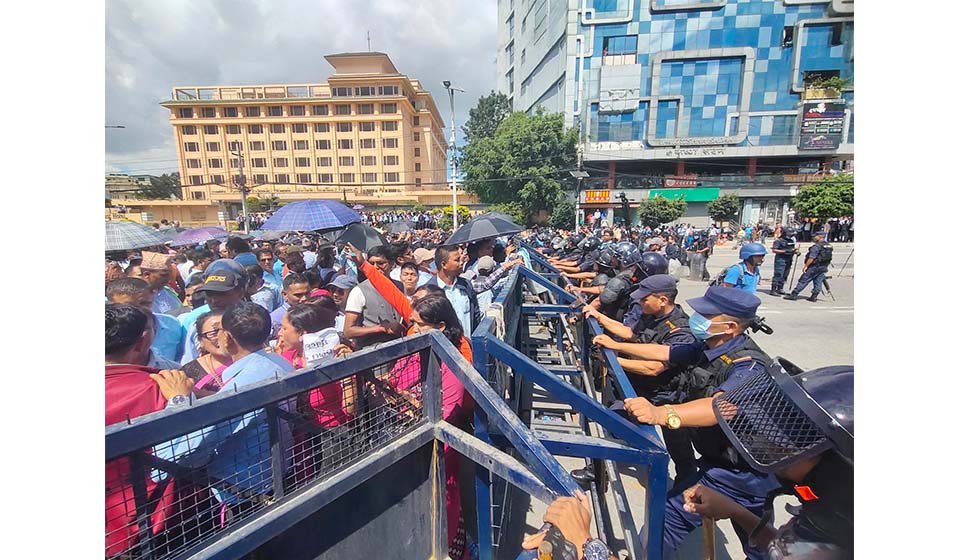Teachers from government schools in Nepal have taken to the streets of Kathmandu to voice their opposition to the newly introduced School Education Bill 2080, showcasing a strong act of dissent.
This move comes at the call of the Nepal Teachers’ Federation, bringing educators from all over the country to Maitighar Mandala to stage demonstrations. They are carrying placards emblazoned with slogans such as ‘Stop abuse of school teachers’ and ‘allocate 20 percent of the total budget for education’.
The core focus of the protest centers around demanding amendments to specific provisions contained in sections 71 to 88 of the bill. These provisions include restrictions on receiving donations, gifts, and support; prohibitions on establishing companies, engaging in business, serving elsewhere, participating in demonstrations, and going on strike. The federation also seeks to amend provisions related to property disclosures, responsible teaching, violations of rules and codes of conduct, salary suspensions for up to five years, promotion suspensions for five years, and teacher dismissals at the local level if one fails to disclose property.
The Nepal Teachers’ Federation has made a comprehensive 17-point demand list, which includes the conversion of temporary teachers to permanent status through internal examinations, ensuring permanent tenure, addressing temporary/contract issues, providing teacher training subsidies, supporting special education, and appointing principals through the Teachers Service Commission.
As of last year, Nepal had 27,343 community schools with a total of 157,354 teachers, including permanent and temporary teachers, and those appointed on relief quotas. The student population stood at 538,200. Laxmi Kishore Subedi, General Secretary of the federation, has urged teachers and employees from all corners of the country to join the ongoing protest in Kathmandu. He expressed dissatisfaction that the Bill failed to address the agreements reached between the government and the federation on February 21, 2019, and February 21, 2022.
The School Education Bill, aimed at revising and integrating education acts, was registered in the House of Representatives on September 13.
In response to the escalating situation, the Ministry of Education has called upon the protesting teachers for negotiation. However, teachers have not attended these talks, signaling their commitment to their cause.
Kathmandu Metropolitan City (KMC) to Take Action Against School Closures
Meanwhile, Kathmandu Metropolitan City (KMC) has made it unequivocally clear that it will not tolerate school closures linked to teachers’ protests. Government school teachers, driven by their dissatisfaction with the proposed School Education Bill, have declared their intention to close schools beginning on Thursday. However, KMC officials have stated that such school closures are unacceptable.
Nabin Manandhar, spokesperson for KMC, emphasized that KMC also has reservations about the School Education Act but believes that closing schools is not an acceptable means of expressing disagreement. He stated, “While we have differing views on the law, closing schools is not an acceptable means of expressing disagreement. Such actions only disrupt children’s education.”
KMC has resolved that if schools are closed, appropriate action will be taken against principals and teachers who do not attend school. Manandhar stated, “We will closely monitor schools tomorrow. If schools are closed, causing a disruption to children’s education, appropriate action will be taken.”
The situation in Kathmandu remains tense as both teachers and local authorities stand their ground in this crucial dispute over education reform in Nepal.
A global media for the latest news, entertainment, music fashion, and more.




